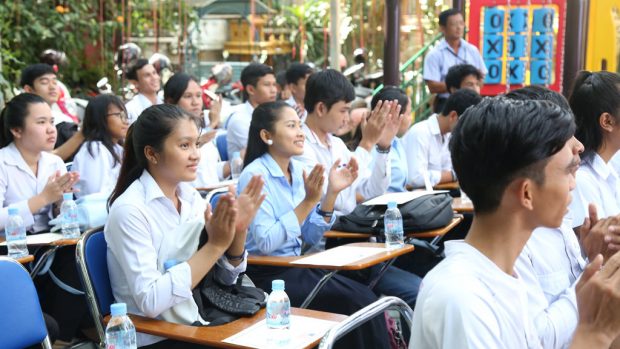[아시아 교육-캄보디아] 고교성적 우수자 왕실서 오토바이 선물
오래 전부터 “교육은 백년대계(百年大計)”라고 해왔습니다. 너무나 당연한 일인데, 종종 잊고 지내는 게 현실이기도 합니다. ‘맹모삼천지교’(孟母三遷之敎)에 압축돼 표현됐듯, 자녀교육을 위해서는 어떠한 희생도 감수하는 것은 전통사회나 현대사회나 그다지 다르지 않는 것 같습니다. <아시아엔>은 아시아 각국의 교육제도를 살펴봤습니다. 국가 리더십과 교육의 비전은 대부분 일치되는 것으로 나타납니다. 편집자
[아시아엔=차이 소팔 아시아엔 캄보디아 특파원, 미디어커뮤니케이션 전문가] 캄보디아는 1975~1979년 크메르 루주의 ‘킬링 필드’ 숱한 민족분란이 겪었다. 이에 대중은 빈약하고 부패한 교육에 대하여 불만을 표출했다.
덕분에 지난 몇년 간 캄보디아의 교육시스템은 크게 발전하였다. 1999년 온전한 평화를 이룬 후 ASEAN에 통합된 캄보디아 왕실(RGC)은 올바른 교육시스템을 도입해 국민들의 인정을 받고 있다. 1863년부터 1953년까지 프랑스 식민지배를 받기 전 캄보디아의 전통교육은 불교 수도원에 그 기반을 두었다.
현재 교육시스템은 6세 이전부터 시작되는 유치원과 6년 간의 초등학교, 3년간의 중학교, 3년간의 고등학교를 거쳐 고등교육기관으로 진학하게 된다. 학생들이 12학년 때 마지막 시험에 통과하지 못할 경우 재수강을 받거나 3년제 ‘준학사’(準學士) 중 하나를 선택할 수 있다. 후자는 보통 사립대학에서 이루어진다.
근래에는 전반적인 교육의 질을 개선하기 위하여 왕실에서 고등학교 마지막 시험성적이 A인 학생들을 대상으로 오토바이 신차와 더불어 4년제 대학 전액장학금을 제공하고 있다. 이 학생들은 대학에서 수강하고 싶은 과목까지도 선택 가능하다. 일부 사립대학은 첫 해를 영어에 투자하기 위하여 1년을 더해 5년의 교육과정을 운영하기도 한다. 가지고 있기도 하다.
일부 지방학교들은 아직도 학생 수에 비해 교과서가 부족한 상태지만, 무상 교과서 배부와 도서관 설립 보조 등으로 정부 차원에서 많은 노력을 하고 있다.캄보디아 교육부 보고서에 따르면, 교육부는 아이들의 조기 교육과 더불어 비정규 학교, 기술 학교, 직업 교육 및 중등, 고등 교육 기회 확장을 주 목표로 삼고 있다.
이에 따라 현재 왕실과 정부뿐 아니라 개발 파트너, 민간단체, 비정부조직, 지역사회, 학부모 등 다양한 구성원들과 협력이 이뤄지고 있다. 캄보디아 교육당국은 이밖에 교사 행동강령 및 관리 강화, 교원 능력개발. 학교 과밀 지역 분산 등을 목표로 하고 있다. 왕실 정부는 교직원 급여를 정상화해 학교에서 벌어지는 비리를 일소할 방침을 세우고 있다. 캄보디아의 상당수 학교는 외국 국가기관과 종교단체, 민간단체, 비정부 조직 등에서 운영하고 있다.
다음은 영어 원문.
Cambodian Education
Chhay Sophal
The Cambodian education system has been improved for years after getting blame from the public for its poor and corrupt system during over 3 decades of civil conflict, including the Khmer Rouge “Killing Fields” regime in 1975-1975 when schools were completely closed and some became prisons.
Since the country has gained complete peace in early 1999 and it integrated in the Association of Southeast Asia Nations (ASEAN), the Royal Government of Cambodia (RGC) tries to reform the Kingdom’s Educational System and it is now back on the right tract with recognition from the public.
The 10 nations of ASEAN consists: Brunei, Cambodia, Indonesia, Malaysia, Myanmar, Laos, Philippines, Singapore, Thailand, and Vietnam
Before the French colony between 1863 and 1953, the Kingdom’s traditional education was based on Buddhist monasteries and this was gradually changed and influenced by the colonial model.
The current education system now is starting from kindergarten level before 6 years of age, the Cambodian kids must go through primary school with 6 grades (1-6), lower secondary school with 3 grades (7-9) and high school with 3 grades (10-12) before moving to the higher education (Faculty or university). When students cannot pass the final exam at grade 12, they can either repeat class or move to 3-year education (associate degree) at university ? mostly private ones.
In recent years in order to improve the general educational quality, RGC has encouraged students who get grade A at the final exam of high school by offering them one new motorbike each and providing scholarship for the whole university with 4-year time (some private universities spend 5 years as they need the first year for English class). Those who get grade A can also choose any subject they like for their university.
Like other schools in the region and around the globe, RGC through the Ministry of Education, Youth and Sport (MoEYS) intends to have the National Education For All (NEA) and continue to give highest priority to equitable access with high quality education, especially basic ones.
While some rural schools still do not have enough text books for pupils, the RGC tries its best to provide free reading books and help set up libraries for them.
According MoEYS report, MoEYS provides greater emphasis to expanding early childhood education, expanding non-formal education, technical and vocational training and expanding opportunities to access secondary education and post-secondary education through the continued and improved partnership among RGC, development partners, private sector, non-governmental organizations, communities and parents.
“Other strong focal points include strengthening the implementation of the Education Law, the teachers’ code of conduct and good governance. At the same time, key components include the capacity development of educational staff at all levels and the encouragement of decentralization,” the report reads.
At the same time, in order to reduce corruption among educational staff and even teachers, RGC has increased their salary every year. Since the reform and open-heart for education, many schools are run by private sector, NGOs and communities with different countries and religions.






